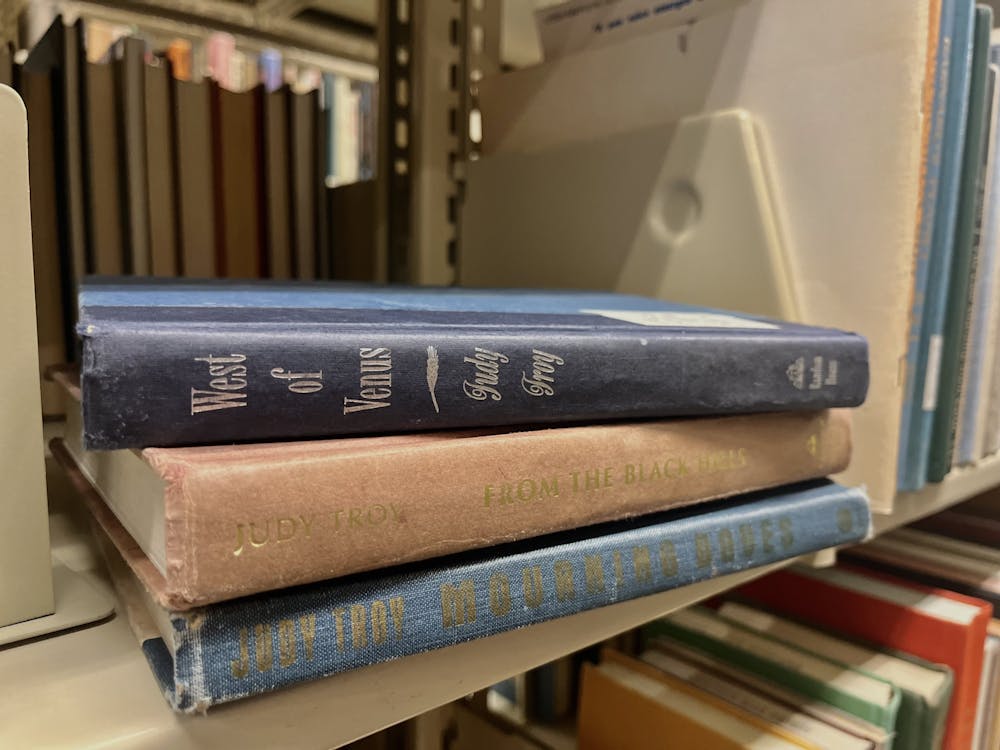Professors equip students with the knowledge they need to succeed in future careers and provide inspiration. By absorbing the advice professors have to give and learning how they succeed in their field, students are capable of seeing the potential for their own futures.
One former Auburn professor in particular, Judy Troy, can be a source of motivation. Judy Troy came to Auburn in 1991, teaching for 19 years in the creative writing department before her retirement.
The recipient of a 1996 Whiting Writer’s Award, Judy Troy has had 13 short stories published in The New Yorker, The Kenyon Review, The Missouri Review, Epoch and The Southern Review, as well as other journals. She is the author of Mourning Doves — a story collection — and three novels, West of Venus, From the Black Hills and The Quiet Streets of Winslow.
Troy loved writing stories from a young age, but she lacked the confidence to share her work with the world.
“I started writing when I was in maybe fifth or sixth grade and I would just write things and put them in a drawer — never showed anybody, never talked about it,” Troy said.
When Troy was a freshman at Indiana University, she received encouragement from an educator. The graduate student who was teaching her composition class had the students write their own stories. Once Troy completed the assignment, the professor read her story in front of the class and after the class.
“He told me, ‘This is what you should do with your life.’ He did everything he could to encourage me,” Troy said.
As Troy was in graduate school at Indiana University, she had another professor who cheered her on. However, encouragement from others can only carry you so far, so Troy had to find the confidence to pursue her passion for writing.
“You really have to believe in yourself, so I just kept on writing and worked really hard at it,” Troy said.
By writing story after story and practicing revision, Troy finally had her work published — first in a journal at the University of Illinois at Chicago, and second in The New Yorker — something that Troy said felt like going from “nothing to everything.”
Troy didn’t find success right off the bat, as she had sent The New Yorker five stories before they took one. When they sent Troy an acceptance letter, she remembers the disbelief she felt and how she asked a friend if they were awake. Her perseverance and hard work had paid off.
“Writing was one thing that I knew I could do,” Troy said. “You just know it inside yourself, and you have to listen to that small voice and not give up.”
Troy’s first short story published in The New Yorker was titled “Mourning Doves,” a story that emerged from a time of personal hardship in her life.
During the course of writing "Mourning Doves," Troy had an older, blind dog who would whimper at night, and she would rub his ear to make him feel better. One evening, Troy was taking her dog out on a walk when he was purposefully hit by a car.
“I was so upset, unhappy," Troy said. "I found I kept reaching my hand down in the middle of the night to rub his ear. And I thought, ‘How is this possible, I know he’s dead. I need to get out of bed, and I need to write a story that uses this knowledge about death — that you can know and not know.’”
From that point on, the pieces in the story began to fall into place. When Troy finished, she told a friend that it had been the first good story she had written.
“It was just a leap from what I’d been writing before, and it’s because of hardship,” Troy said.
Troy’s writing process involves lots of patience, revision and the scrapping of entire stories.
“What I do is try to come up with the first sentence that compels me, and that’s really hard to figure out,” Troy said. “So I come up with a lot of first sentences that I abandon, or first paragraphs that I abandon or whole stories that I abandon.”
Troy added that failure helps you figure out what isn’t working in a story, which then helps reveal what will work.
“Stick with it. Don’t listen to people who say you shouldn’t be writing or you’re wasting your time,” Troy advised.
The English department at Auburn University was home to many memories for Troy, which is where she met her husband, Miller Solomon. The pair still resides in Auburn, where Troy has just finished her newest novel.
The encouragement Troy received from educators, and provided as a former one herself, demonstrates how the support professors provide will continue to lift students up for a lifetime.
Do you like this story? The Plainsman doesn't accept money from tuition or student fees, and we don't charge a subscription fee. But you can donate to support The Plainsman.
Ella Walton, majoring in English literature with a minor in creative writing, currently serves as the Newsletter Editor at The Auburn Plainsman. Formerly the Culture Editor, Walton has been with The Auburn Plainsman since the fall of 2023.






